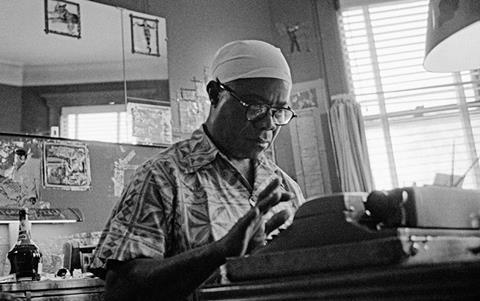Sacha Jenkins crafts a portrait of iconic musician Louis Armstrong and an exploration of racial inequality

Dir: Sacha Jenkins. US. 2022. 107mins
A graceful overview of one of the 20th century’s greatest artists, Louis Armstrong’s Black & Blues puts politics, musical appreciation and personal history into one attractive package. Built around excerpts from Armstrong’s home audio recordings, which he made in private over the decades, the documentary is far from exhaustive and yet, as a primer for why Armstrong remains influential, this inquisitive portrait successfully manages to render him as both a titan and a nuanced human being.
Jenkins presents Armstrong as a man who was widely viewed as apolitical but who, behind closed doors, deeply cared about racial inequality
World premiering in Toronto, Black & Blues debuts on Apple TV+ starting October 28. Jazz fans should be intrigued, although the film, directed by Sacha Jenkins, will probably be better appreciated by those who don’t know all the particulars of Armstrong’s life. Especially in our Black Lives Matter era, the documentary detailing of Armstrong’s cultural importance during several tempestuous racial periods in America could give the picture extra traction.
Featuring interviews with musicians, scholars and Armstrong’s late wife Lucille — his fourth (and last) marriage — the documentary glides from topic to topic, focusing on key moments in his early creative trajectory, including the fact that he grew up in poverty, before contemplating specific aspects of his legacy whether that be his health issues or criticism from some in the Black community that his agreeable public persona was a way to cater to white audiences.
Jenkins (Wu-Tang Clan: Of Mics And Men) gathers many voices from the past to bring Armstrong back to life. (He died in 1971 at the age of 69.) Black & Blues features archival talk-show clips with Armstrong, but they can’t compare to the intimacy and candour of the home audio recordings, in which the musician is far blunter (and more profane) about the bigotry he experienced. On stage, Armstrong sought to be a cheery presence, but those recordings tell a different story — as do some written correspondence, which is fierily narrated by hip-hop artist Nas. Throughout, Jenkins presents Armstrong as a man who was widely viewed as apolitical but who, behind closed doors, deeply cared about racial inequality.
At just over 105 minutes, including end credits, Black & Blues can’t hope to fully cover a performer who has inspired multiple biographies. But, aided by editors Jason Pollard and Alma Herrera-Pazmino, the film does a good job of elegantly segueing from one area of interest to the next. Some digressions are more engaging than others — Armstrong’s fascination with herbal laxatives probably isn’t crucial, but helps humanise him — while a few will leave viewers hungry for more detail. (A whole documentary could be devoted to how his gravelly, animated singing style and deft trumpet solos revolutionised the art form.)
And yet, there’s a coherence to Black & Blues that acknowledges that much is missing from this portrait but nonetheless offers much to consider. Investigating his fascination with Hollywood and re-examining the more outspoken stands he made later in his life about the importance of integrated schools, the documentary wants mostly to start a conversation about an iconic but often oversimplified jazz giant.
Along the way, Jenkins also succeeds in crafting a casual chronicle of American racism during his subject’s lifetime. Over the different stages of his career — budding young performer, electrifying jazz sensation, beloved national figure — Armstrong had to confront a nation that was hostile to Black people. (In one audio recording, Armstrong bitterly recalls a conversation he had with one white fan, who informed him that he hated most Black men and women but liked him.) His ability to navigate those treacherous waters got him ridiculed by fellow Black artists who claimed he was betraying their cause, but Black & Blues takes pains to suggest that there were unseen emotional tolls — and that he never abandoned the fight for social justice.
As would be expected, the documentary is littered with indelible Armstrong performances, that radiant, growling voice highlighting each number. Black & Blues may be principally suited to newcomers, but credit to Jenkins for saving the singer’s most popular tune until the very end. Indeed, his rendition of ‘What A Wonderful World’ has been so overplayed in popular culture as to risk being becoming a musical cliche but, after the film’s highlighting of the man’s trials and tribulations, the song accrues deeper meaning. Like Armstrong’s boisterous demeanour, ‘What A Wonderful World’ is filled with love, but that kind of joy only comes from someone who has known comparable sorrow.
Production company: Imagine Documentaries
Worldwide distribution: Apple TV+
Producers: Sara Bernstein, Justin Wilkes, Sacha Jenkins, Julie Anderson
Cinematography: Ed Lachman
Editing: Jason Pollard, Alma Herrera-Pazmino
Music: Terence Blanchard






![The Brightest SunScreen[Courtesy HKIFF]](https://d1nslcd7m2225b.cloudfront.net/Pictures/274x183/3/5/0/1448350_thebrightestsunscreencourtesyhkiff_312678.jpg)















![The Brightest SunScreen[Courtesy HKIFF]](https://d1nslcd7m2225b.cloudfront.net/Pictures/100x67/3/5/0/1448350_thebrightestsunscreencourtesyhkiff_312678.jpg)

